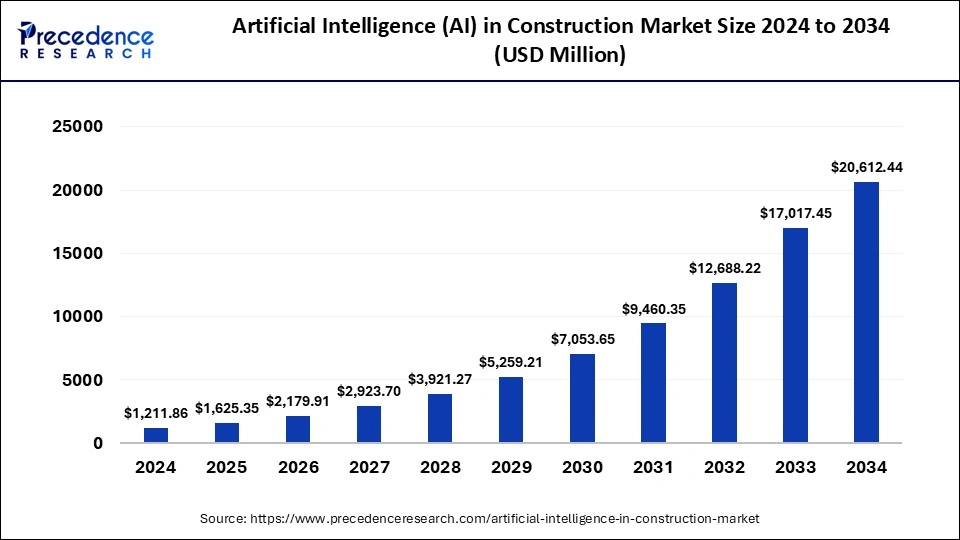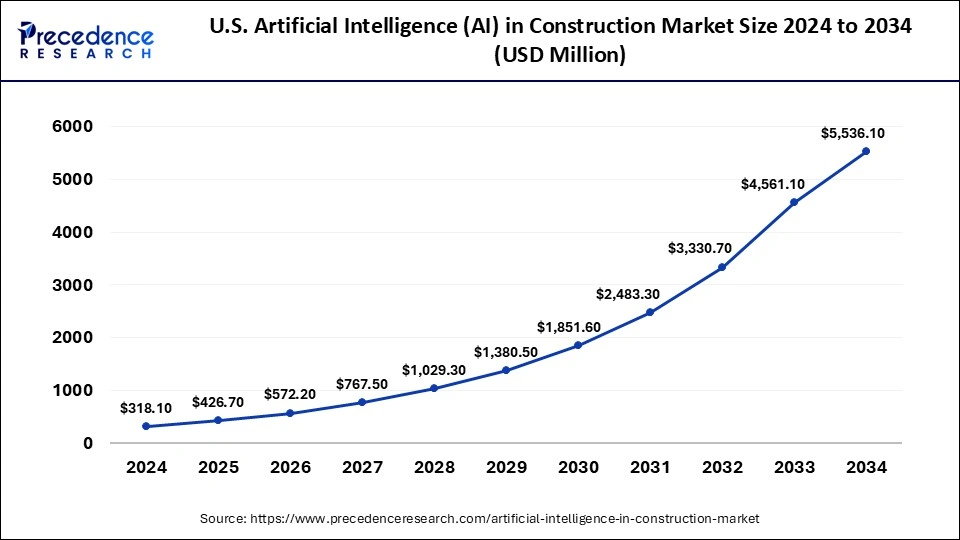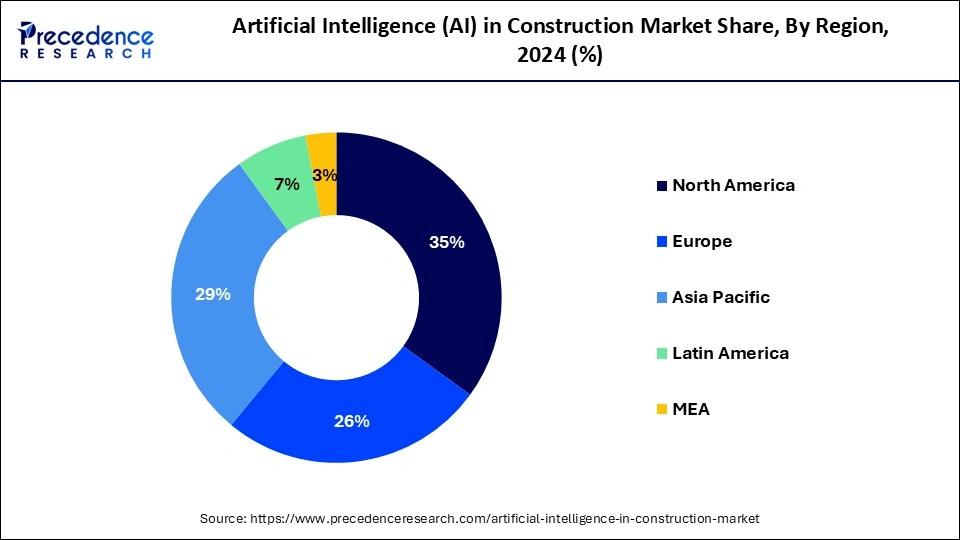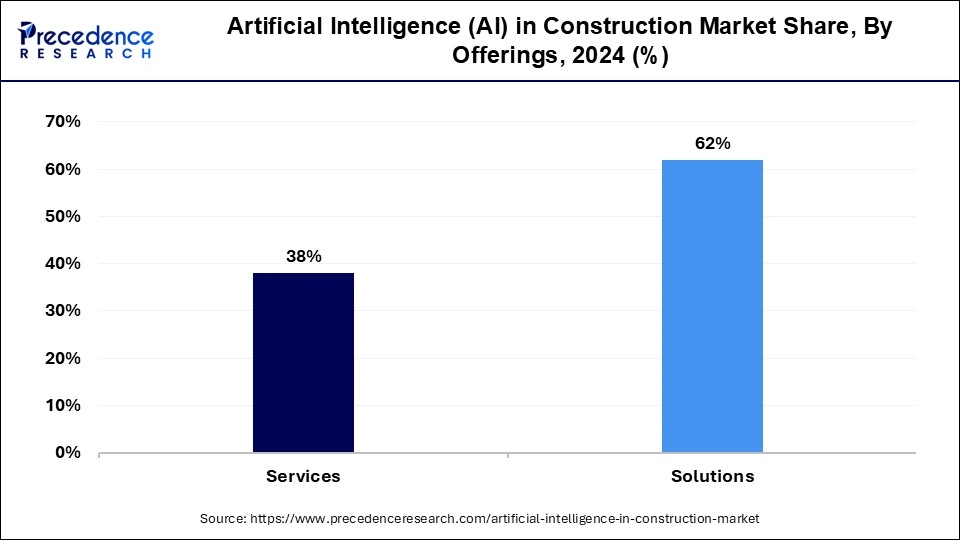February 2025
The global artificial intelligence (AI) in construction market size is calculated at USD 1,625.40 million in 2025 and is forecasted to reach around USD 20,612.40 million by 2034, accelerating at a CAGR of 32.76% from 2025 to 2034. The North America market size surpassed USD 424.15 million in 2024 and is expanding at a CAGR of 32.77% during the forecast period. The market sizing and forecasts are revenue-based (USD Million/Billion), with 2024 as the base year.
The global artificial intelligence (AI) in construction market size accounted for USD 1,211.90 million in 2024 and is predicted to increase from USD 1,625.40 million in 2025 to approximately USD 20,612.40 million by 2034, expanding at a CAGR of 32.76% from 2025 to 2034. Improved efficiency and productivity in construction due to AI-based solutions have raised the demand for AI in the market, thus fuelling artificial intelligence (AI) in construction market globally.

The U.S. artificial intelligence (AI) in construction market size was exhibited at USD 424.15 million in 2024 and is projected to be worth around USD 7,214.35 million by 2034, growing at a CAGR of 32.76% from 2025 to 2034.

North America dominated the global artificial intelligence (AI) in construction market in 2024. The region's robust construction industry, coupled with a high adoption rate of advanced technologies, drives the integration of AI into construction processes. The presence of major technology companies and AI innovators, such as IBM, Microsoft, and Google, provides the necessary infrastructure and expertise to support AI development and implementation in construction.
Moreover, North America benefits from substantial investments in infrastructure projects and smart city initiatives, particularly in the United States and Canada. These investments create a conducive environment for the deployment of AI solutions to enhance efficiency, safety, and sustainability in construction projects. Thus driving the artificial intelligence (AI) in construction market.
Additionally, the region's regulatory framework encourages the use of advanced technologies for improved safety and environmental compliance. Government incentives and policies aimed at promoting green building practices further support AI adoption in construction. The combination of technological leadership, substantial investments in infrastructure, and supportive regulatory policies position North America as a dominant region in the artificial intelligence (AI) in construction market, fostering continuous growth and innovation.

Asia Pacific is expected to witness the fastest growth in the market in the upcoming period, driven by rapid urbanization, economic growth, and substantial infrastructure investments. Countries like China, India, and Japan are in charge of implementing AI to enhance efficiency, reduce costs, and improve safety in construction projects. Government initiatives promoting smart cities and sustainable building practices further accelerate AI adoption. Additionally, Asia's technological advancements and increasing focus on digital transformation create a favorable environment for AI integration in construction. The region's large-scale construction projects and tech sector make Asia a hotspot for AI-driven growth in the construction industry.
The artificial intelligence (AI) in construction market is rapidly growing, driven by advancements in machine learning, robotics, and data analytics. AI applications in construction include project management, design optimization, predictive maintenance, safety monitoring, and autonomous machinery. Increased efficiency, reduced costs, and enhanced safety are key benefits. Major players include IBM, Autodesk, and Trimble. The market faces challenges like high initial costs and a need for skilled labor. However, with ongoing innovation and increased adoption, it is poised for significant expansion in the coming years.
| Report Coverage | Details |
| Market Size by 2034 | USD 20,612.40 Million |
| Market Size in 2025 | USD 1,625.40 Million |
| Market Size in 2024 | USD 1,211.90 Million |
| Market Growth Rate from 2025 to 2034 | CAGR of 32.76% |
| Largest Market | North America |
| Base Year | 2024 |
| Forecast Period | 2025 to 2034 |
| Segments Covered | Offerings, Deployment, Deployment, Industry Type, and Regions |
| Regions Covered | North America, Europe, Asia-Pacific, Latin America, and Middle East & Africa |
Improved efficiency and productivity due to AI
A major driver of artificial intelligence (AI) in construction market is the increasing demand for improved efficiency and productivity. The construction industry has historically struggled with project delays, cost overruns, and safety concerns, making the adoption of AI technologies a crucial solution. AI offers significant enhancements in project management through predictive analytics, which helps in anticipating potential issues before they arise, ensuring projects stay on schedule and within budget.
Another significant driver of the artificial intelligence (AI) in construction market is the advancement in AI and machine learning technologies, which have become more accessible and affordable. These advancements enable construction firms to leverage AI for design optimization, automating repetitive tasks, and enhancing overall project planning.
AI-powered tools can analyze vast amounts of data from previous projects to identify best practices and improve future project outcomes. Safety is another critical factor driving AI adoption. AI systems can monitor construction sites in real time, identifying potential hazards and ensuring compliance with safety regulations. This reduces the risk of accidents and enhances worker safety, which is a top priority for construction companies.
The rise of smart cities and the increasing focus on sustainable building practices are propelling the demand for the artificial intelligence (AI) in construction market. AI can optimize energy usage, improve waste management, and ensure buildings are designed with sustainability in mind. Government regulations and incentives for green construction further support this trend.
High initial investment
One significant restraint of the artificial intelligence (AI) in construction market is the high initial investment required for implementing AI technologies. Construction companies, especially small and medium-sized enterprises (SMEs), often face financial constraints that make it challenging to allocate substantial capital for AI adoption. The costs associated with acquiring advanced AI tools, integrating them with existing systems, and training personnel to effectively use these technologies can be prohibitive.
Additionally, the construction industry is traditionally conservative and slow to adopt new technologies. There is a general reluctance to change established processes, and a lack of understanding of AI's potential benefits further hampers its adoption. Companies may also face challenges in justifying the return on investment (ROI) of AI projects, especially when the benefits are long-term and not immediately apparent. The complexity of AI integration, requiring specialized knowledge and skills, adds another layer of difficulty. Construction firms may struggle to find or develop the necessary expertise to manage and maintain AI systems, leading to resistance to adopting these advanced technologies. Consequently, the high initial investment and integration challenges serve as notable restraints in the artificial intelligence (AI) in construction market.
Smart city initiatives
One significant opportunity in the artificial intelligence (AI) in construction market is the growing trend toward smart city initiatives. As urbanization increases, cities worldwide are investing in smart infrastructure to enhance the quality of life, improve efficiency, and ensure sustainability. AI technologies play a crucial role in the development of these smart cities by optimizing construction processes, improving resource management, and enabling the creation of intelligent buildings.
AI can provide real-time data analytics and predictive insights, allowing for better planning and execution of construction projects. This ensures timely completion and reduces costs, which are critical factors for large-scale urban development projects. Additionally, AI-driven solutions can enhance energy efficiency, waste management, and safety protocols in construction, aligning with the goals of smart city projects. The increasing support from governments and municipalities for smart city projects, coupled with significant investments in urban infrastructure, presents a lucrative opportunity for artificial intelligence (AI) in construction market. Companies that can offer innovative AI solutions tailored to smart city requirements will find themselves in a strong position to capitalize on this growing demand, driving market growth and technological advancements.
The solution segment held the largest market share of the artificial intelligence (AI) in construction market globally. The growth of this segment is attributed to several factors, like the regenerative design of buildings or construction areas, which can be simulated by using AI tools before starting construction, making it easy to adopt. Also, AI solutions can offer various complex task optimizations where accuracy is needed. Summarizing the long documents related to the administrative works in the context of legal policies and compliance set by the authority to build any construction within an area they have legally.

The cloud segment is expected to show the fastest growth in the artificial intelligence (AI) in construction market in the foreseeable period. The dominance of this segment is due to its versatile offering and convenience, which are provided by cloud-based solutions for enterprises that want to employ artificial intelligence solutions. Cloud-based AI solutions offer scalability, which allows enterprises to expand their operations easily and with significantly low-cost investments. They provide accessibility, enabling teams to access critical data and tools from anywhere, fostering collaboration and real-time decision-making. Additionally, cloud solutions are cost-effective, reducing the need for extensive hardware and maintenance.
The inherent flexibility of cloud platforms allows for seamless integration with other technologies and systems used in construction. Major providers like Amazon Web Services (AWS), Microsoft Azure, and Google Cloud are continually enhancing their offerings, further driving adoption. Consequently, the cloud segment is expected to maintain its leading position in the artificial intelligence (AI) in construction market.
The large enterprise segment dominated the market in 2023. This segment dominates the artificial intelligence (AI) in construction market due to its substantial financial resources, enabling significant investment in advanced technologies. These enterprises benefit from economies of scale, leveraging AI to optimize large-scale projects, enhance efficiency, and reduce costs. Their extensive operational scope requires sophisticated AI solutions for project management, predictive analytics, and safety monitoring. Additionally, large enterprises often lead in innovation, adopting cutting-edge AI tools to stay competitive. Their established market presence and ability to integrate AI seamlessly into existing workflows further solidify their dominance in this market.
The institutional commercials segment is projected to witness the fastest growth rate during the forecasted years. The institutional and commercial segments dominate the artificial intelligence (AI) in construction market due to their complex and large-scale project requirements. These sectors often involve high-value, multifaceted projects such as hospitals, universities, office buildings, and retail centers, which benefit significantly from AI-driven solutions. AI enhances project management, design optimization, and predictive maintenance, leading to increased efficiency, reduced costs, and improved safety.
Moreover, these segments typically have the financial resources and motivation to invest in advanced technologies to ensure timely project completion and adherence to regulatory standards. The need for smart building solutions, driven by sustainability and energy efficiency goals, further propels AI adoption in institutional and commercial construction. Consequently, these segments are at the forefront of integrating AI to enhance operational effectiveness and project outcomes.
By Offerings
By Deployment
By Organization Size
By Industry Type
By Geography
For inquiries regarding discounts, bulk purchases, or customization requests, please contact us at sales@precedenceresearch.com
No cookie-cutter, only authentic analysis – take the 1st step to become a Precedence Research client
February 2025
March 2025
December 2024
December 2024